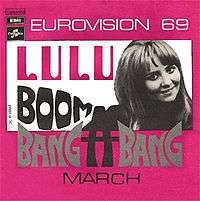Boom Bang-a-Bang
"Boom Bang-a-Bang" is a song recorded by British singer Lulu. The song was written by Alan Moorhouse and Peter Warne. It is best known as the British winning entry at the Eurovision Song Contest 1969, held in Madrid.
| "Boom Bang-a-Bang" | |
|---|---|
 | |
| Single by Lulu | |
| Released | 1969 |
| Length | 2:22 |
| Label | EMI Music/Columbia Records |
| Songwriter(s) | Alan Moorhouse and Peter Warne |
| Eurovision Song Contest 1969 entry | |
| Country | |
| Artist(s) | |
| Language | |
| Composer(s) | Alan Moorhouse |
| Lyricist(s) | |
| Conductor | |
| Finals performance | |
| Final result | 1st (tie) |
| Final points | 18 |
| Entry chronology | |
| ◄ "Congratulations" (1968) | |
| "Knock, Knock Who's There?" (1970) ► | |
It was the joint winner with three other entries: Salomé singing "Vivo cantando" for Spain, Lenny Kuhr singing "De troubadour" for the Netherlands, and Frida Boccara singing "Un jour, un enfant" for France.
The song was the second consecutive entry with a nonsense title to win the contest (after Massiel's triumph in 1968 with "La La La"), and became infamous in the comedy world - most notably inspiring Monty Python's Flying Circus to parody it with "Bing Tiddle-Tiddle Bong" (Python precursor I'm Sorry, I'll Read That Again had previously had Bill Oddie do something similar with a song for which the title was rendered entirely in sound effects). The Python parody song was part of the "Europolice Song Contest" sketch in the "How To Recognize Different Parts of the Body" episode in 1970.
Lyrically, the song is a plea from the singer to her lover to "cuddle me tight". She then goes on to explain that "my heart goes boom bang-a-bang boom bang-a-bang when you are near", complete with appropriate musical accompaniment. The single made No. 2 in the UK Singles Chart and was a major hit throughout Europe.[1][2][3][4][5][6]
The song was succeeded as the winner in 1970 by Dana singing "All Kinds of Everything" for Ireland.
Over two decades after its first release, the song was included on a blacklist of banned songs issued by the BBC during the 1991 Gulf War.[7]
"Boom Bang-A-Bang" was also the name of a BBC One 1-hour programme made to celebrate 50 Years of the Eurovision Song Contest in 2006. Broadcast in Eurovision week, the special was hosted by Sir Terry Wogan and featured archive footage and highlights of past contests, along with a performance of that year's UK entry by Daz Sampson. The song is the theme tune for the BBC Three sitcom Him & Her (2010).
Lulu also recorded the song in German, Italian and French, all also titled Boom Bang-a-Bang, but none were as successful as the English original. A Spanish version is also thought to have been recorded, but this has never been confirmed and whereas three of the other versions were included on the double CD To Sir, With Love - The Complete Mickie Most Recordings the fabled Spanish version was omitted (as was the German version), suggesting the version widely in circulation is in fact a cover by another artist and not by Lulu herself. A 7" single, released in Spain at the time, certainly seems to indicate that Lulu sang the song in Spanish herself.[8]
Chart performance
| Chart (1969) | Peak position |
|---|---|
| Australia Kent Music Report[9] | 15 |
| Ö3 Austria Top 40[10] | 10 |
| Belgium Ultratop[1] | 4 |
| Denmark Hitlisten[11] | 9 |
| Dutch Single Top 100[12] | 19 |
| Official Finnish Charts[4] | 10 |
| German Musikmarkt[13] | 8 |
| Irish Singles Chart[2] | 1 |
| New Zealand RIANZ[14] | 5 |
| Norway VG-lista[3] | 1 |
| Spain Promusicae[4] | 5 |
| Swiss Hitparade[5] | 3 |
| UK Singles Chart[6] | 2 |
See also
References
- "Belgium charts". BECharts.
- "Irelandcharts". IECharts. Archived from the original on 2014-04-09. Retrieved 2018-07-03.
- "Norway charts". NORCharts.
- "Billboard Magazine, June, 1969". Billboard.
- "Switzerland charts". CHCharts.
- "Official UK charts". UKCharts.
- "BBC Four - More Dangerous Songs: And the Banned Played On - 16 songs banned by the BBC". BBC. Retrieved 2019-04-10.
- Boom bang-a-bang (spanish version) - Lulu Music on Vinyl, retrieved 2018-04-16
- McGrath, Noel. Australian Encyclopaedia of Rock. Outback Press.
- "Austria charts". AUTCharts.
- "Billboard Magazine, May 24, 1969". Billboard.
- "The Netherlands charts". NLCharts.
- "Germany charts". DECharts.
- "New Zealand charts". Flavour of New Zealand.
| Preceded by "La, La, La" by Massiel |
Eurovision Song Contest winners co-winner with "Un jour, un enfant" by Frida Boccara, "De troubadour" by Lenny Kuhr and "Vivo cantando" by Salomé 1969 |
Succeeded by "All Kinds of Everything" by Dana |
| Preceded by "Congratulations" by Cliff Richard |
United Kingdom in the Eurovision Song Contest 1969 |
Succeeded by "Knock, Knock Who's There?" by Mary Hopkin |